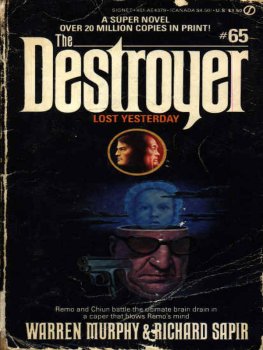Warren Murphy - Hostile Takeover
Here you can read online Warren Murphy - Hostile Takeover full text of the book (entire story) in english for free. Download pdf and epub, get meaning, cover and reviews about this ebook. genre: Science fiction. Description of the work, (preface) as well as reviews are available. Best literature library LitArk.com created for fans of good reading and offers a wide selection of genres:
Romance novel
Science fiction
Adventure
Detective
Science
History
Home and family
Prose
Art
Politics
Computer
Non-fiction
Religion
Business
Children
Humor
Choose a favorite category and find really read worthwhile books. Enjoy immersion in the world of imagination, feel the emotions of the characters or learn something new for yourself, make an fascinating discovery.

- Book:Hostile Takeover
- Author:
- Genre:
- Rating:3 / 5
- Favourites:Add to favourites
- Your mark:
- 60
- 1
- 2
- 3
- 4
- 5
Hostile Takeover: summary, description and annotation
We offer to read an annotation, description, summary or preface (depends on what the author of the book "Hostile Takeover" wrote himself). If you haven't found the necessary information about the book — write in the comments, we will try to find it.
Hostile Takeover — read online for free the complete book (whole text) full work
Below is the text of the book, divided by pages. System saving the place of the last page read, allows you to conveniently read the book "Hostile Takeover" online for free, without having to search again every time where you left off. Put a bookmark, and you can go to the page where you finished reading at any time.
Font size:
Interval:
Bookmark:
Destroyer 81: Hostile Takeover
By Warren Murphy apir
Chapter 1
The panic started in Hong Kong.
It was ten A. M. Hong Kong time. Trading was light on the floor of the Hang Seng Stock Exchange. Red-coated traders were shouting buy and sell orders in what was their normal controlled frenzy of trading. It was a day like any other. At first.
Loo Pak was the first to notice the news coming in over his pocket Quotrek computer.
Pak wore his Quotrek clipped to his belt, like an oversize pocket pager. He had just bought sixty shares of IBM and decided to check the black device. He pressed a button and the liquid crystal display came to life. The device was tied into an electronic subscription service provided by the British news agency Reuters. For a hefty monthly fee, Loo Pak had access to minute-by-minute news bulletins and stock transactions critical to doing business in the fast-moving world of global finance. It was news that as often as not would not see print for days-if ever.
To the average citizen, the Reuters bulletins were often fragmentary or meaningless. Not to Loo Pak. To him, the price of wheat in Chicago or the situation in Cambodia could have instant impact on his livelihood. The Reuters service acted as an early-warning device as important as radar.
Loo Pak blinked as he watched the black LCD letters form a headline. His eyes went wide. The headline was brief: "GLB DOWN 27 POINTS IN NIKKEI TRADING."
To Loo Pak that curt string of symbols held a world of meaning. It meant that the price per share of the hitherto fast-rising Global Communications Conglomerate had lost an unprecedented twenty-seven points on Tokyo's Nikkei Stock Exchange. It was dropping like a stone.
Loo Pak was heavily invested in GLB. He had already lost thousands of U. S. dollars in the four seconds it took him to absorb the bad news.
Loo Pak jumped up, waving both hands.
"Glob to sell!" he cried in English, the world-wide language of business. "Glob" was the pit term for GLB. "Any takers?"
A trader offered him fifty-five per share. He obviously hadn't gotten the news. Loo Pak took him up on it. In a twinkling, with no more than a staccato exchange of terse sentences and a few scribbled notations on their traders' books, Loo Pak had divested all his GLB stock and the other trader was positioned to eat a big loss. Unless GLB rebounded.
GLB didn't rebound. The new price hit the big electronic ticker tape. Word raced around the exchange floor that GLB, the world's largest communications conglomerate, was heading for the cellar. Anxiously, sweaty-armpitted traders conferred with their pocket Quotreks. Sell orders were shouted, and accepted. In the time that it took to execute them, the value had dropped another five points. The room began to heat up.
And on the electronic ticker overhead, the string of stock codes and numbers began to drop lower and lower. Not just for GLB, but for virtually every stock being traded.
It had begun. And once begun, there was no stopping it.
Within fifteen minutes, over two thousand professional traders were scurrying around the paper-littered floor of the Kabutocho Exchange in Tokyo, Japan. Their Quotreks were warning that Hong Kong's Hang Seng Index had dropped a stunning 155 points-dragged down because of heavy sell-offs of Global Communications Conglomerate stock by investors and mutual funds. Computerized trade programs kicked in. And were executed. In a twinkling, massive blocks of stock moved like ghostly juggernauts-impelled by the shout of a voice, the touch of a button. Not a coin was offered. Not a single stock certificate was touched by a human agency. No securities physically changed hands. Nor would they. The exchanges might as well have been trading in air. Only abstract numbers changed. In traders' books. On computers and in international bank accounts.
But those numbers were all-important. For they represented more than mere gold or jewels. They represented man's faith in other men and the rules that governed international commerce.
And it was all about to unravel.
With the frenzy of sharks, Tokyo began unloading GLB holdings. And within ten minutes, Singapore and Melbourne were doing the same. Milan's Palazzo Mezzanotte trading floor buzzed with rumors as the opening bell was delayed twenty minutes. Frankfurt and Zurich markets started buying dollars, and then, realizing that the New York Stock Exchange was only hours away from opening, reversed themselves and sold.
By the time London's Financial Times Stock Exchange opened, it was a tidal wave. It washed over London's financial district like an invisible storm, beggaring major investors in a matter of minutes. And then, having wrought its soulsickening carnage, it continued on, moving west, unseen, impalpable, unstoppable-but as devastating as a firestorm.
Overhead, orbiting recon satellites snapped photographs of a placid blue cloud-wreathed planet. The earth spun as it always had. Precision lenses recorded ordinary October weather-a sandstorm in the Sahara, a hurricane forming off Puerto Rico, rainstorms in the heart of Brazil, and the first snowstorm in upper Manitoba.
The lenses did not-could not-record the greatest upheaval in modern world history. Because it was panic, fueled by fear and kept alive by sentinel communications satellites as they squirted bursts of news back and forth between the continents.
And then the two-way message traffic changed ominously. The flow shifted west. Frantic telexes, cables, faxes, and transcontinental phone calls choked every line of communication known to modern man. Every one of them contained a single word.
It was a common word, but in the context it was being transmitted, it held the potential to plunge the world into an abyss of darkness and despair.
The word was "Sell."
Chapter 2
His name was Remo and he held the clusters of varicolored balloons in front of his face as he entered Tallahassee, Florida's State House.
The guard at the door noticed the balloons immediately and called over to Remo from his security desk.
"I knew this was a bad idea," Remo muttered under his breath. He shifted his position so the balloons floated between him and the guard.
"What's your business here?" the guard wanted to know.
"Balloongram for the governor," Remo said. He didn't bother to disguise his voice. His voice wasn't the problem. It was his face. And his thick wrists. The wrists were, if anything, more of a giveaway than his high-cheekboned face. That was why his Chicken Wire uniform was two sizes too big for him. The cuffs bunched up around his freakish wrists, hiding them.
"I'll check with his office," the guard said, reaching for his station phone.
"You can't do that," Remo said hastily. A sea-green balloon bumped his nose.
"Why not?" the guard asked, looking up. He clutched the receiver in his beefy hand.
Remo thought fast. He didn't want to hurt the guard. The man was only doing his job. And Remo was here to hit the governor. No one else.
"Because it's a surprise," Remo whispered through the balloons. "It's his birthday."
"It won't hurt if I check with his secretary," the guard said, tapping buttons on the telephone keypad.
"Yes, it will," Remo said. "Trust me."
The guard hesitated. "How's that?"
"The governor's wife sent them."
"So?"
"I guess you haven't heard," Remo whispered conspiratorially.
"Heard what?"
"The governor and his secretary. They're, you know, intimate. "
"No!" The guard breathed. "I hadn't heard that." He was looking at Remo through bubbles of elastic balloon. He saw a face that was broken up into distorted translucent coral-pink, ocher, and burgundy spheres. He wondered what had happened to primary colors.
"If you let the secretary know I'm coming," Remo went on, "she'll probably tell you it's not the governor's birthday or something. You know how jealous secretaries are."
Next pageFont size:
Interval:
Bookmark:
Similar books «Hostile Takeover»
Look at similar books to Hostile Takeover. We have selected literature similar in name and meaning in the hope of providing readers with more options to find new, interesting, not yet read works.
Discussion, reviews of the book Hostile Takeover and just readers' own opinions. Leave your comments, write what you think about the work, its meaning or the main characters. Specify what exactly you liked and what you didn't like, and why you think so.




